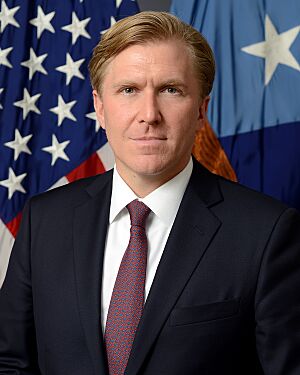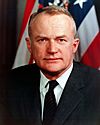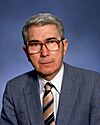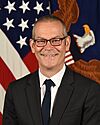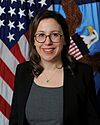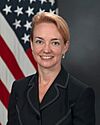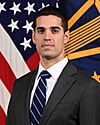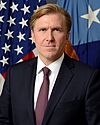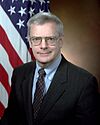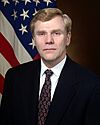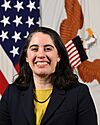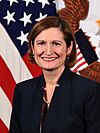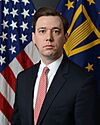Under Secretary of Defense for Policy facts for kids
Quick facts for kids Under Secretary of Defense for Policy |
|
|---|---|

Flag of an under secretary of defense
|
|
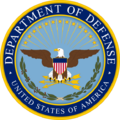
Seal of the Department of Defense
|
|
| United States Department of Defense Office of the Secretary of Defense |
|
| Style | Mr. Under Secretary |
| Reports to | Secretary of Defense Deputy Secretary of Defense |
| Appointer | The president with Senate advice and consent |
| Term length | No fixed term |
| Formation | 1978 |
| First holder | Stanley Rogers Resor |
| Succession | 5th in SecDef succession |
| Deputy | Principal Deputy Under Secretary of Defense for Policy |
| Salary | Executive Schedule, level III |
The United States Under Secretary of Defense for Policy (often called USDP) is a very important civilian leader in the United States Department of Defense. This person helps the top defense leaders, like the Secretary of Defense and the Deputy Secretary of Defense, make big decisions about how the country stays safe. They focus on creating plans and rules for national security and defense. The President chooses this person, and the Senate must agree.
Contents
Understanding the Under Secretary's Role
The office of the Under Secretary of Defense for Policy is like a main team that helps the Secretary of Defense. They work on creating important plans, managing resources, and checking how well defense programs are doing. The Under Secretary is a high-ranking position in the government.
Key Teams and Responsibilities
The Under Secretary of Defense for Policy leads several important teams. Each team focuses on different parts of keeping the country safe and working with other nations.
Planning for the Future
The assistant secretary of defense for strategy, plans, and capabilities (ASD(SPC)) helps create the main plans for national security and defense. This includes thinking about new ways to protect the country and working with other nations on security.
- The deputy assistant for force development helps decide how the military should be built and trained to meet future challenges.
- The deputy assistant for global partnerships works on building strong relationships with other countries to improve security together.
- The deputy assistant for plans and posture helps decide where military forces should be located around the world and how they should plan their operations.
- The deputy assistant for strategy helps create the overall defense plan for the country and makes sure money is spent to support this plan.
Working with Other Countries
The assistant secretary of defense for international security affairs (ASD (ISA)) focuses on defense plans and working with countries in different parts of the world. This includes Europe, the NATO, Russia, the Middle East, and Africa.
- The deputy assistant for African affairs works on defense plans and cooperation with countries in Sub-Sahara Africa.
- The deputy assistant for the Middle East focuses on defense plans and cooperation with countries in the Middle East and North Africa.
- The deputy assistant for Europe and NATO works on defense plans and cooperation with countries in Europe and the NATO.
- The deputy assistant for Russia, Ukraine, and Eurasia works on defense plans and cooperation with countries in those regions.
- There are also special representatives who work with international groups like the U.S. Mission to NATO and the Organization for Security and Co-operation in Europe.
Protecting the Homeland
The assistant secretary of defense for homeland defense and hemispheric affairs (ASD(HD&HA)) is in charge of plans and actions to protect the United States at home. This includes dealing with dangerous weapons, digital attacks, and supporting local authorities during emergencies.
- The deputy assistant for countering dangerous weapons works on plans to protect against and stop the spread of very harmful weapons (chemical, biological, radiological, and nuclear).
- The deputy assistant for homeland defense integration helps coordinate how different groups work together to protect the country and support local communities.
- The deputy assistant for defense continuity makes sure the government can keep working and important missions can continue even during major emergencies.
Special Missions and Challenges
The assistant secretary of defense for special operations/low-intensity conflict (ASD(SO/LIC)) handles special military missions and smaller conflicts. This includes fighting terrorism, special reconnaissance, and helping other countries with their defense.
- The deputy assistant for counternarcotics and global threats works on plans to deal with drug issues and other worldwide dangers.
- The deputy assistant for stability and humanitarian affairs focuses on helping areas in conflict and providing aid to people in need.
- The deputy assistant for special operations and combating terrorism works on plans for special forces, fighting terrorism, and influencing public opinion.
Security in Asia and the Pacific
The assistant secretary of defense for Indo-Pacific security affairs (ASD(IPSA)) focuses on defense plans and working with countries in the Indo-Pacific region.
- The deputy assistant for East Asia works on defense cooperation with countries like Taiwan, Mongolia, Japan, South Korea, and North Korea.
- The deputy assistant for China focuses on defense relations with China, including Hong Kong.
- The deputy assistant for South and Southeast Asia works on defense cooperation with countries like India, Bangladesh, Brunei, Indonesia, Malaysia, Philippines, Singapore, Thailand, Vietnam, Australia, and New Zealand.
- The deputy assistant for Afghanistan, Pakistan, and Central Asia works on defense cooperation with countries in that region.
Space and Advanced Technologies
The assistant secretary of defense for space policy (ASD(SP)) is responsible for defense plans related to space, nuclear weapons, digital attacks, and missile defense. This person also advises the Secretary of Defense on digital defense.
- The deputy assistant for nuclear and dangerous weapons policy helps create plans for nuclear deterrence and stopping the spread of dangerous weapons.
- The deputy assistant for cyber policy helps set the rules for digital defense and works with other government groups and allies on digital security.
- The deputy assistant for space and missile defense advises on plans to protect against attacks from space and missiles.
- The deputy principal cyber advisor helps guide military digital forces and activities.
Finding Missing Service Members
The director of the Defense POW/MIA Accounting Agency is responsible for finding and bringing home U.S. military personnel who were listed as prisoners of war (POW) or missing in action (MIA) from past wars and conflicts.
Helping Allies with Defense
The director of the Defense Security Cooperation Agency helps friendly nations by providing financial and technical support, defense equipment, and training. They also encourage military-to-military connections.
Protecting Defense Technology
The director of the Defense Technology Security Administration is responsible for creating and enforcing rules to protect important defense-related goods, services, and technologies when they are shared internationally.
Past Under Secretaries of Defense for Policy
Many important people have held the role of Under Secretary of Defense for Policy since it was created in 1978. Here are some of them:
| No. | Portrait | Under Secretary | Took office | Left office | Time in office | Secretary of Defense | President | Ref(s) |
|---|---|---|---|---|---|---|---|---|
| 1 | Stanley Rogers Resor | 14 August 1978 | 1 April 1979 | 230 days | Harold Brown | Jimmy Carter | - | |
| 2 | Robert Komer | 24 October 1979 | 20 January 1981 | 1 year, 88 days | Harold Brown | Jimmy Carter | - | |
| 3 | Fred Iklé | 2 April 1981 | 19 February 1988 | 6 years, 323 days | Caspar Weinberger Frank Carlucci |
Ronald Reagan | - | |
| 12 | Colin Kahl | 28 April 2021 | 17 July 2023 | 2 years, 80 days | Lloyd Austin | Joe Biden | - | |
| - | Sasha Baker Acting |
18 July 2023 | 26 April 2024 | 283 days | Lloyd Austin | Joe Biden | - | |
| - | Amanda J. Dory Acting |
27 April 2024 | 22 January 2025 | 270 days | Lloyd Austin | Joe Biden | - | |
| - | Alexander Velez-Green Acting |
22 January 2025 | 15 April 2025 | 83 days | Pete Hegseth | Donald Trump | - | |
| 13 | Elbridge Colby | 15 April 2025 | Incumbent | 301 days | Pete Hegseth | Donald Trump | - |
Principal Deputy Under Secretary
The Principal Deputy Under Secretary of Defense for Policy is the main helper to the Under Secretary. This role was created to give advice and support to the Secretary of Defense, Deputy Secretary of Defense, and the Under Secretary on national security and defense plans.
| No. | Portrait | Deputy Under Secretary | Took office | Left office | Time in office | Secretary of Defense | President | Ref(s) |
|---|---|---|---|---|---|---|---|---|
| 1 | I. Lewis Libby | 12 August 1992 | 10 January 1993 | 151 days | Paul Wolfowitz Dick Cheney |
George H. W. Bush | - | |
| 2 | Walter B. Slocombe | 1 June 1993 | 14 September 1994 | 1 year, 105 days | Les Aspin William J. Perry |
Bill Clinton | - | |
| 3 | Jan M. Lodal | 3 October 1994 | 30 September 1998 | 3 years, 362 days | William J. Perry William S. Cohen |
Bill Clinton | - | |
| - | Melissa Dalton Acting |
26 April 2024 | 29 May 2024 | 33 days | Lloyd Austin | Joe Biden | - | |
| - | Cara L. Abercrombie Acting |
29 May 2024 | 20 January 2025 | 236 days | Lloyd Austin | Joe Biden | - | |
| - | Amanda J. Dory Acting |
22 January 2025 | 17 March 2025 | 54 days | Pete Hegseth | Donald Trump | - | |
| - | Austin Dahmer Acting |
17 March 2025 | Incumbent | 330 days | Pete Hegseth | Donald Trump | - |
 | Aurelia Browder |
 | Nannie Helen Burroughs |
 | Michelle Alexander |


